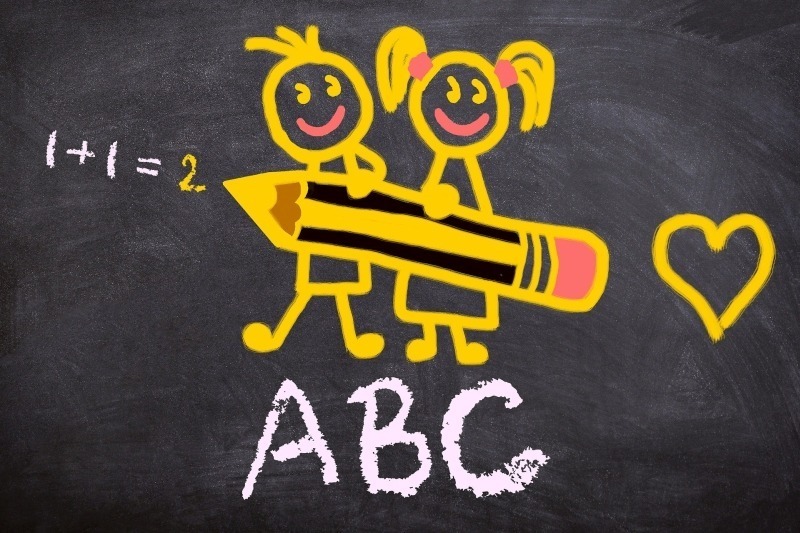Education is very important, giving children the knowledge and skills that they will need to move forward in life. Skills like reading, writing, critical thinking, decision making and being independent. From an early age they are like little sponges soaking up the world around them, be it at home, school, even just walking around their community and discussing what they see, and all children learn in different ways and at different speeds.
Whilst by certain ages they should have learned specific things and be meeting the age required targets, no two kids are the same. All children learn at their own pace; some will be at the expected age levels, some will be ahead and some will be behind. For those who are slightly behind, with a bit of intervention at school and at home, many will have little jumps and get to the stages they should to be at.
We send our children to school to get a good education, but a child’s education can’t just be left to schools and their teachers; they learn just as much and home. There are plenty of educational toys, games, books and websites that can help you support and further your child’s educational in their own home, a lot of which are fun, entertaining and see children learning without knowing that they are.
Children will perform better at school when their families take an interest in their education and do things at home to supplement and support what they are being taught at school. So, no matter what stage your children are at, whether they are hitting their targets or not quite getting there, supporting them in their learning can only help them to achieve more. It is never too late to get involved with their education and you may even learn some new things yourself – phonics was a system I had never used until a few years ago, and despite my initial reservations, I found it to be a fantastic system which really works. I only wish I had learnt it sooner.
To support your child at school:
- Speak to your child’s teachers and see where they are at and what you can do at home to support them.
- Have realistic expectations and avoid putting your child under pressure.
- Let them develop at their own pace and consult with their teacher if there are any concerns.
- Rather than criticising them if they are getting something wrong, modify your language to give feedback rather than criticism, e.g. saying ‘that didn’t seem to quite work, how else could we do it?’ instead of ‘you got it wrong again’. Negative criticism will put kids off and see them lose interest, whereas working with them and giving positive reassurance will go a long way. Positive feedback and support from their parent(s)/carers will help them think about where they went wrong and how they can fix it, (encouraging independence) rather than feeling like a failure if constantly receiving negative comments.
If your child is really struggling at school then speak to your child’s teacher and even the SENco; it could be that a simple change at school or home may help, or it might mean they might need more specialist intervention, but they won’t get the help if your ignore the problem.
- Listen to the professionals, take their advice onboard and work with them rather than against them.
- Work with the school and the teachers, rather than just leaving them to it.
- Meet your child’s teachers and teaching assistants.
- Get to know who’s who at your child’s school, such as headteacher, receptionist/office manager, SENCO etc, they all play an important role.
- Attend any parents’ evenings to keep in touch with your child’s teacher and find out how your child is doing and if they need any extra support or input at home.
- Ask for extra support if you think your child may need it.
- If your child has homework, make sure that it gets done – even if you don’t agree with how much they get.
- Keep up to date with school newsletters and their website and be aware of school policies (they can usually be found on the school website) as they can be quite useful.

Support their education by reading to them for at least ten minutes per night – and when they are able, get them to read to you. Most importantly, read together!
Use games that support maths, phonics and science. There are some great tabletop games to help with this and not only will they not only help with learning, they are great fun too. We loved using the Junior Learning Word Families literacy game which supports phonics, word building, reading and helps to increase vocabulary whilst also encouraging team play, turn taking and patience.
Whilst we all try to limit screen time, computer skills are a necessity and children do need to learn to use them responsibly. If you are giving your child a tablet, laptop or phone to use, there are plenty of fun and educational apps around. We found Reading Eggs and the free Maths Chase website to be of particular use, and lots of fun to boot.
- Demonstrate a positive attitude to education, school and learning.
- Monitor television, video game and Internet use – children learn a lot through play and socialising with their friends rather than staring at a screen. Screens do have their place, just in moderation.
- Talk with your child as this will help not only with language skills but listening and social skills.
- Encourage your child to read – reading is the single most important thing that you can do to help the child to succeed in school and life – reading is the key to lifelong learning.
- Inspire your child to use the library by using it yourself – libraries are underused and under threat of closures, but they contain a wealth of knowledge and don’t cost anything to use.
- Promote active learning – encourage them to ask questions and get involved.
- Encourage outdoor pursuits, sports, visits to the museum – they all hold educational value.
Learning just isn’t all about studying from books! Children learn best from fun activities, where they can learn, enjoy themselves and have quality family time as well.
You can do an awful lot to support your child’s education, and to help you with some ideas we have been trying out some books, games, toys, science kits, dig kits from National Geographic, logic games and even a coding robot, all of which can help support education in a fun way.

















